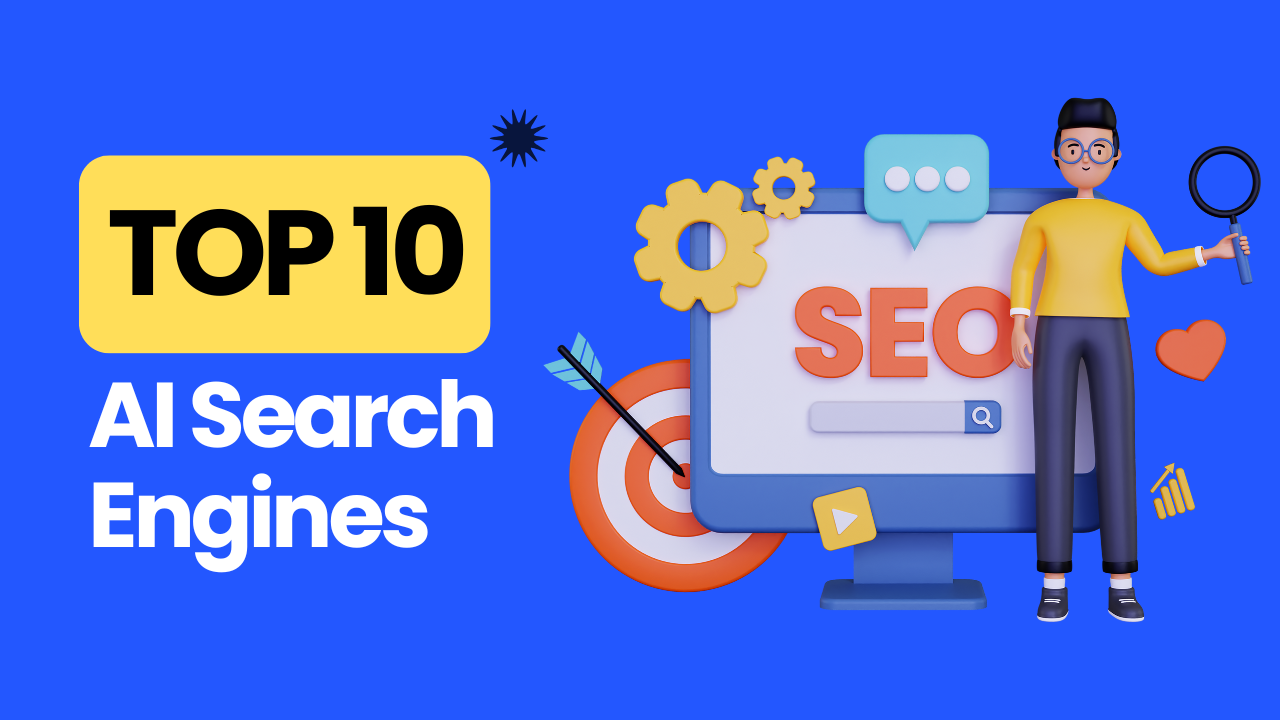
Best AI Search Engines to Use as Google Search Alternatives
- Open AI Research
- February 12, 2025
- No Comments
Traditional Google search has long been the go-to for internet browsing. But here’s the catch: Only 41% of the results you see are genuinely helpful, with 34% of the top results dominated by ads, many of which lack transparency. If this leaves you frustrated, it’s time to consider AI-powered search engines, which offer a more streamlined, efficient, and engaging way to find information. AI search engines are smarter, faster, and much more intuitive compared to the old-school search methods you might still be relying on. These innovative engines understand your queries better, reduce information overload, and provide summaries that answer your questions directly. Welcome to the future of search.
What Makes AI Search Engines Special?
AI search engines leverage machine learning, natural language processing, and knowledge graphs to enhance your search experience. They understand the meaning behind your queries rather than just matching keywords. This allows them to deliver more relevant, personalized results and even summarize complex data. No more endless sifting through irrelevant pages—AI search engines do the heavy lifting for you.
Key Benefits of AI Search Engines:
- Enhanced understanding of natural language queries
- Personalized and contextually relevant results
- Ability to answer complex questions and provide summaries
- Improved accuracy and efficiency in finding information
Here’s a look at some of the most popular AI search engines that could be your new go-to alternative for Google.
Top AI Search Engines For Google
- SearchGPT: Real-time browsing with graphs, images, and maps.
- You.com: Multipurpose AI search with customizable agents.
- Perplexity: AI search with visual outputs and summaries.
- Microsoft Copilot: Summarized AI search with citation-based results.
- DuckDuckGo AI: Privacy-first AI search with limited features.
- Brave: Private search engine with AI enhancements.
- Komo: Versatile AI search with personas and summaries.
- Waldo: Professional AI search for market and trend analysis.
- Andi: Simple, private AI search with no ads.
- Gemini: Google’s AI chatbot summarizing search results.
1. SearchGPT– Real-time browsing with a rich set of features

Pros:
- Real-time search results with graphs, images, and maps.
- Provides direct interaction with the map and summarized information.
- Useful for various queries like weather, news, and stocks.
Cons:
- Maps are limited to Google Maps integration.
- Currently available only to paid users, with free access pending.
- Requires subscription for full access to premium features.
Pricing:
Available to paid subscribers; free access expected soon.
2. You.com– AI-powered, customizable search engine

Pros:
- Lets you customize AI agents and specify resources.
- Offers access to 20+ AI models.
- Supports document uploads for personalized results.
Cons:
- Minimal visuals compared to traditional search engines.
- Limited to a few websites for search results.
- Requires a paid upgrade for unlimited searches after three daily premium queries.
Pricing:
Free basic version with premium plans starting at $9.99/month.
3. Perplexity-Visually engaging search with multiple AI models
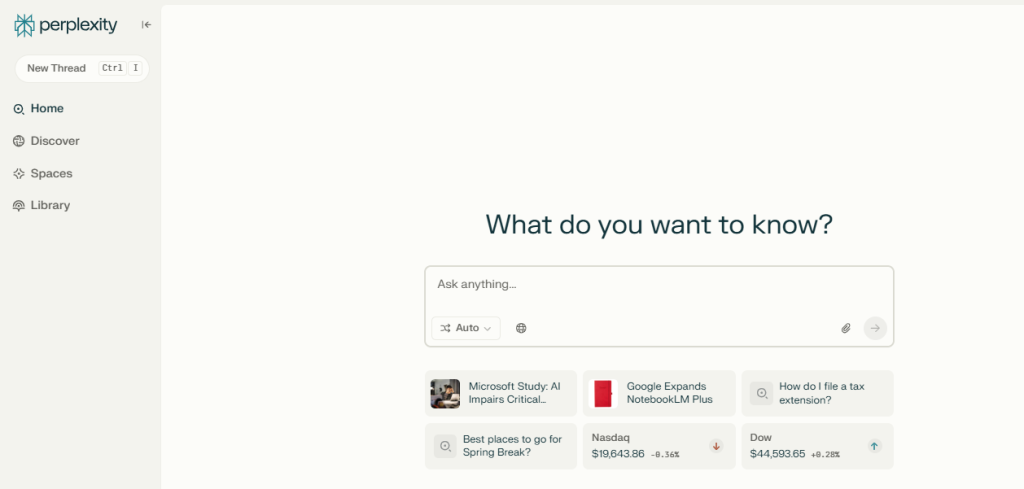
Pros:
- Attractive interface with visual elements.
- Summarizes multiple sources for a concise response.
- Supports both free and premium users with additional features.
Cons:
- Limited in answering the latest questions without premium access.
- May provide outdated or incorrect information without updates.
- Visual elements may not always load properly.
Pricing:
Free with limited features, Pro plans available starting at $5/month.
4. Microsoft Copilot– AI-enhanced search with summarized results

Pros:
- Summarizes web results neatly.
- Pulls data from the live web for real-time answers.
- Helps with complex queries while citing original sources.
Cons:
- Minimal visual content in results.
- Cannot respond to sensitive or political queries.
- Limited interaction capabilities for follow-up questions.
Pricing:
Free for basic use, additional features available with Microsoft 365 subscription.
5. DuckDuckGo AI-Privacy-first AI search engine
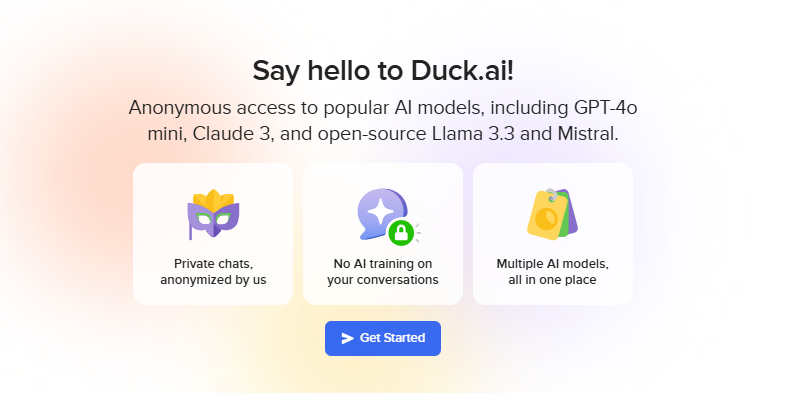
Pros:
- Prioritizes user privacy and avoids tracking.
- Includes both AI Assist and Chat features for better results.
- On-demand summaries of search results.
Cons:
- AI Chat feature in beta with no access to live web results.
- Lacks ability to handle follow-up questions.
- No option to receive summaries automatically with every search.
Pricing:
Free for all users.
6. Brave– Privacy-focused search engine with AI enhancements

Pros:
- Provides AI-generated summaries from multiple sources.
- Focus on privacy with no tracking.
- Offers an AI assistant, Leo, for follow-up queries.
Cons:
- Visual content is limited.
- No follow-up queries for search summaries.
- No current support for map-based results.
Pricing:
Free, with premium options for advanced features.
7. Komo– Versatile AI-powered search engine for various tasks
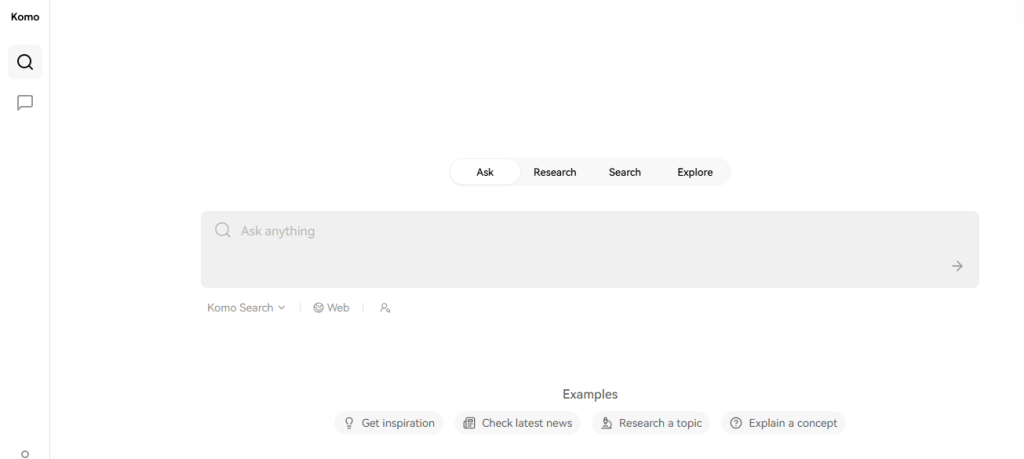
Pros:
- Access to multiple AI models like OpenAI, Anthropic, and Meta.
- Offers tailored “Personas” for tasks like writing and research.
- Supports mind maps and social sharing for logged-in users.
Cons:
- Limited features for free users.
- No visual outputs for certain types of queries.
- Premium users have access to advanced AI models.
Pricing:
Free basic access, premium features available starting at $8/month.
8. Waldo– AI search for professionals and businesses
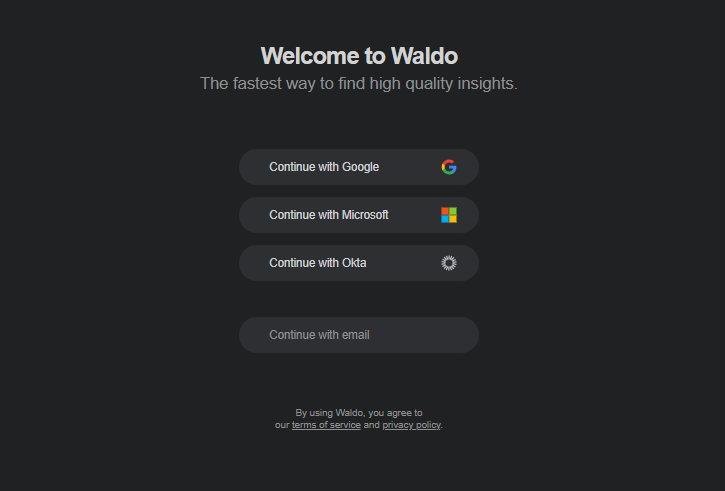
Pros:
- Useful for brand audits, competitor analysis, and research.
- Can pull real-time data from hundreds of sources.
- Allows follow-up questions and team collaboration.
Cons:
- No free version; pricing is geared toward businesses.
- Best suited for professionals, not casual users.
- Basic plans are relatively expensive.
Pricing:
Starts at $149/month for basic professional use.
9. Andi– Simplified, privacy-first AI search
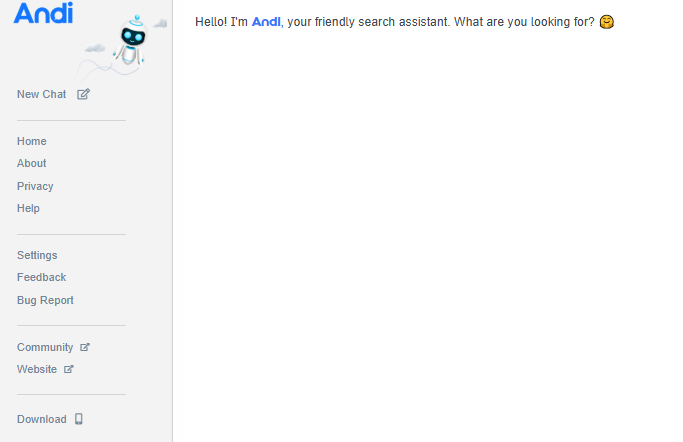
Pros:
- Minimalist design with ad-free interface.
- Focuses on user privacy and does not track data.
- Provides detailed search summaries on-demand.
Cons:
- No follow-up queries for further exploration.
- Results can be overly text-heavy with few visuals.
- Lacks the ability to modify responses after the search.
Pricing:
Free for all users.
10. Gemini (by Google)– Google’s own AI-powered search assistant

Pros:
- Uses Google’s vast search database to provide quick answers.
- Users can adjust tone and length of responses.
- Provides a helpful, summarized response for general queries.
Cons:
- Limited visuals in search results.
- Struggles with sensitive topics like elections and wars.
- Results lack comprehensive source citations.
Pricing:
Free with optional premium upgrades.
Conclusion:
AI search engines represent a major leap forward in how we access information online. Whether you prioritize privacy, visual results, or follow-up questions, there’s a tool designed to meet your needs. These platforms are not just about finding answers—they’re about providing a smarter, more intuitive search experience. As AI continues to evolve, these search engines will only become more powerful, paving the way for a new era of internet browsing that goes beyond keywords. It’s time to leave behind the limitations of traditional search and explore the smarter, more engaging world of AI-powered alternatives.
Check out the latest blog on 13 Best Excel AI Tools to streamline your workflow, automate tasks, and boost productivity! Discover more powerful AI tools—log on to TheAISurf and elevate your workflow today!
